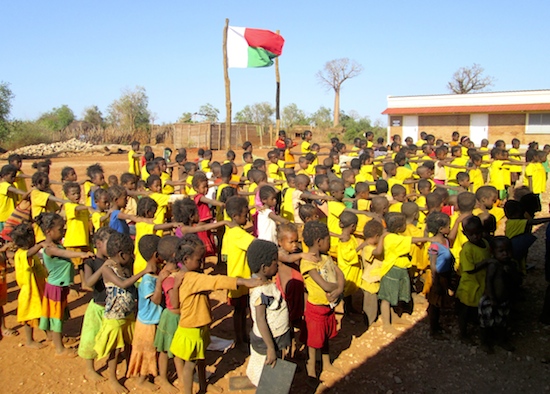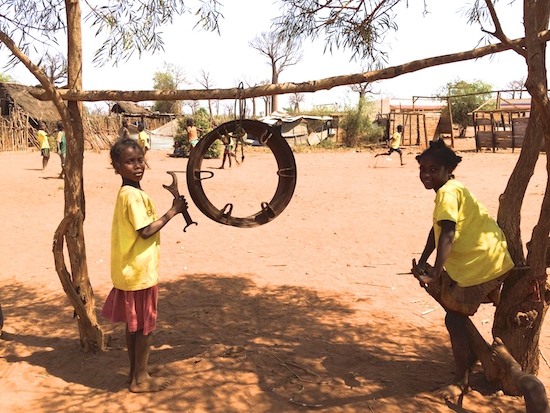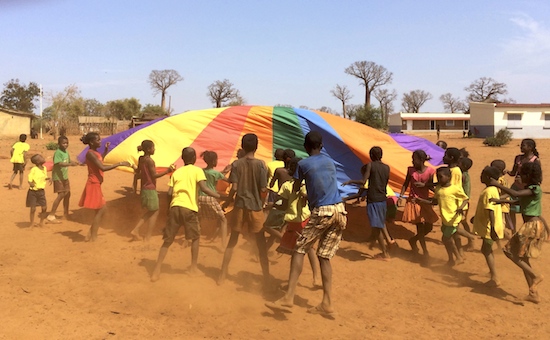 October 24 2013 – Last night I slept on the cement schoolroom floor, with a lambahoany (a colorful cotton cloth) as a blanket and a travel pillow that, for some reason, turned to stone. I hear Jonoro, Hanitra and the children stirring across the room and children’s voices in the schoolyard. It’s 6 am but the village has been awake for awhile so it’s time to get moving. Fortunately, it doesn’t take long to get ready since I slept in my clothes . A quick face wipe and some toothpaste and I’m good to go.
October 24 2013 – Last night I slept on the cement schoolroom floor, with a lambahoany (a colorful cotton cloth) as a blanket and a travel pillow that, for some reason, turned to stone. I hear Jonoro, Hanitra and the children stirring across the room and children’s voices in the schoolyard. It’s 6 am but the village has been awake for awhile so it’s time to get moving. Fortunately, it doesn’t take long to get ready since I slept in my clothes . A quick face wipe and some toothpaste and I’m good to go.
I wander to the small house where Jo meets me with steaming coffee. I’ve said it before and will say it many times again – this is the best coffee anywhere. We sit together in the tiny room to eat bread together as the village women come in and out for supplies. They have been hard at work for hours preparing to feed the schoolchildren and their siblings a hot mid-day meal. Like last night, no one will be turned away.
Visitors begin to line up outside the door. I’m happy to see my old friend, Baba Reposa. He looks worn, hungry and weary but his face still lights up when he sees us. Amvola and the other Mikea women approach with big smiles, toting new children that I don’t recognize. We talk awhile and everyone expresses their condolences for the passing of my mother and say they understand why I didn’t visit them in Anjabetrongo last year. These friends understand death and grief and I’m touched by their loving words. I want to sit and talk longer but the school day is about to begin.
 Six yards from my head, a child bangs a rusted tire rim with an iron rod. This sends me into momentary shock and 160+ children scurrying to the schoolyard. I watch as they form lines in front of their respective classrooms in an orderly fashion. Teacher Tete takes them through several drills. Arms up! Attention! At ease! When he has their focus, Tete gives the command to walk single-file into the classroom, which they do without shoving or yelling or running. Honestly, as far as miracles go, this is right up there with Moses parting the Red Sea or Jesus calming the storm with a word. I’m impressed and, once again, I start to reminisce. I think about the sacrifices that Jonoro and Hanitra made and the many lonely days and nights they spent as a family as they tried to get a school started in this place where education is not as important as food. And now I stand looking at 13 and 14 year olds who were all little ones when we started this program a decade ago. Hanitra and I re-tell the story of the school’s beginnings to the older classes, encouraging them to thank God and take advantage of the opportunities He has given them. They listen attentively, seriously, taking it all in.
Six yards from my head, a child bangs a rusted tire rim with an iron rod. This sends me into momentary shock and 160+ children scurrying to the schoolyard. I watch as they form lines in front of their respective classrooms in an orderly fashion. Teacher Tete takes them through several drills. Arms up! Attention! At ease! When he has their focus, Tete gives the command to walk single-file into the classroom, which they do without shoving or yelling or running. Honestly, as far as miracles go, this is right up there with Moses parting the Red Sea or Jesus calming the storm with a word. I’m impressed and, once again, I start to reminisce. I think about the sacrifices that Jonoro and Hanitra made and the many lonely days and nights they spent as a family as they tried to get a school started in this place where education is not as important as food. And now I stand looking at 13 and 14 year olds who were all little ones when we started this program a decade ago. Hanitra and I re-tell the story of the school’s beginnings to the older classes, encouraging them to thank God and take advantage of the opportunities He has given them. They listen attentively, seriously, taking it all in.
We decide to begin the school day with a craft that allows the children to express their creativity in a simple way. We talk about the creative gifts in them and how they were made in the image of God to create and live beautiful lives. They all love the craft – and again, they listen carefully.
 While we’re moving from classroom to classroom, Jonoro heads out of the village to buy maize for the Mikea family of Chief Fandahara. Food is still scarce since the 2013 cyclone destroyed their crops and the Mikea, especially, are suffering. We’ve brought funds to purchase maize for each household. It won’t last until a new harvest but every bit helps.
While we’re moving from classroom to classroom, Jonoro heads out of the village to buy maize for the Mikea family of Chief Fandahara. Food is still scarce since the 2013 cyclone destroyed their crops and the Mikea, especially, are suffering. We’ve brought funds to purchase maize for each household. It won’t last until a new harvest but every bit helps.
After the children finish their craft, Hanitra calls them outside for recess. We unwrap a new 24 foot parachute and the games begin. The children have never seem such a thing before and joyous chaos ensues. While there are many educational games that can be played with a parachute, those will need to wait for another day. Today, they make up their own games and end recess by running and singing through the forest,the parachute held high over their heads.
The long day in Anjabetrongo village has begun. We’ll be busy until well after dark – teaching, planning, playing, feeding, storytelling, refereeing, talking, singing, laughing, listening…loving. What a great way to spend a day!
